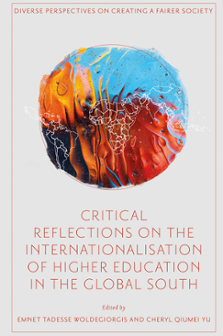
Index
Critical Reflections on the Internationalisation of Higher Education in the Global South
ISBN: 978-1-80455-779-2, eISBN: 978-1-80455-778-5
Publication date: 26 April 2024
Citation
(2024), "Index", Woldegiorgis, E.T. and Yu, C.Q. (Ed.) Critical Reflections on the Internationalisation of Higher Education in the Global South (Diverse Perspectives on Creating a Fairer Society), Emerald Publishing Limited, Leeds, pp. 251-257. https://doi.org/10.1108/978-1-80455-778-520241015
Publisher
:Emerald Publishing Limited
Copyright © 2024 Emnet Tadesse Woldegiorgis and Cheryl Qiumei Yu
INDEX
(see also Higher education)
(see also Transnational education (TNE))
- Prelims
- Chapter 1: Introduction
- Chapter 2: Internationalisation of Higher Education Under Neoliberal Imperatives: The Political Economy of Student Mobility in Africa
- Chapter 3: Perspectives and Challenges of Internationalising Higher Education from and for the Global South
- Chapter 4: ‘You Look International’: Scale and Global Performativity
- Chapter 5: Internationalisation of Higher Education in Brazil: Advances and Challenges
- Chapter 6: Transnational Education in South/Southeast Asia: Thoughts and Reflections from a Higher Education Partner University in the United Kingdom
- Chapter 7: Towards Emplacing Internationalisation in Thai Higher Education
- Chapter 8: On a (More) Equal Footing: Bridging ‘the West’ & ‘the Arab World’ Through Virtual Exchange
- Chapter 9: A Critical Exploration of the Drivers and Strategies of University Internationalisation in Ghanaian Higher Education
- Chapter 10: The ‘Quest for Relevance’: Reconceptualising and Redefining Internationalisation of Higher Education in South Africa
- Chapter 11: Rethinking the Internationalisation of Higher Education in South Africa in the Post-Pandemic Era: Towards a Blended Future
- Chapter 12: Assisting International Students Through Student Support Services in Uganda
- Chapter 13: Conclusion
- Index